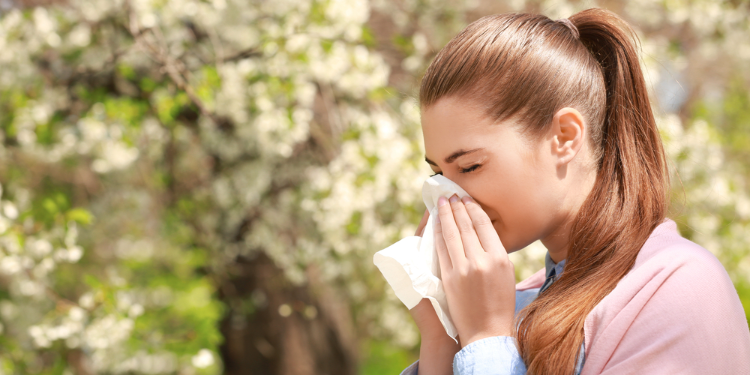Why allergies can be more severe abroad
As you've probably observed, your environment has changed as you settled in a new country. The most obvious adaptations are the ones that catch your eye right away. Whether it's moving from a warm country to a cold one or from a chilly climate to a tropical paradise, these significant shifts can affect your body and immune system. Different environments have their unique characteristics and the allergens that come with them. Additionally, climate change is also contributing to the rise in allergies. Warmer temperatures encourage the growth of plants, leading to earlier and more prolonged flowering and pollination seasons. Furthermore, air pollution contributes to higher risks of allergies.
In general, it depends on where you used to live and where you are moving to. You don't really have to relocate to the opposite side of the globe to experience changes. Moving to a neighboring country can be enough for you to observe the onset of allergies. Interestingly, some individuals who weren't previously allergic may develop allergies once they arrive in their new host country. This situation can not only cause discomfort but also place a significant burden on their expat experience. They don't really enjoy their life abroad as much as they'd have liked.
Solutions to avoid allergies when living abroad
Find out about the country before you move
If you have significant allergies, you're probably used to being careful when you travel. The same level of caution is required for those with milder allergies. But even if you've never had allergies before, it's a good idea to learn about the climate in your host country. Some people struggle with cold weather, extreme heat, high humidity, and other environmental factors.
Check your vaccinations
Do you have to get vaccinated against yellow fever or tick-borne encephalitis for your move? If you're allergic to egg proteins, these vaccines may contain them. Vaccines for the flu, mumps, and measles could also include egg proteins. Make sure to inform healthcare providers about your egg protein allergy so they can implement necessary precautions like desensitization or administer vaccinations in small doses under medical supervision.
Avoid contact with allergens
It is easier said than done. You won't always be able to stay away from tree-lined streets. For instance, avoid going for a walk in the park during times of high air pollution or allergy triggers. Keep an eye on the weather forecast and, if you can, stay indoors when pollen levels are elevated. If you have to go outside, consider wearing a mask.
Adopt good indoor practices
Ventilate your home to refresh and circulate the air, but be mindful of when you do it. Avoid opening the windows when the pollen count is high to prevent allergens from entering your home. Consider using air filters and ensure you maintain them properly. Regularly clean your home's controlled mechanical ventilation (VMC) system to eliminate dust. Invest in appropriate bedding, such as a hypoallergenic pillowcase, if you have allergies to mold or dust mites, for example.
Adopt good driving practices
Pollution levels are typically lower in the early morning or late evening. Adjusting your driving schedule or public transportation use based on pollution levels can be challenging. To compensate, treat your car with the same care as your home. Make it a habit to clean your car regularly and replace its air filters. On high-pollution days, keep your vehicle windows closed while driving. When you return home, avoid walking around your house in outdoor clothes. Instead, leave your street shoes at the entrance and change into indoor clothes after taking off your outdoor attire and showering. This separation of outdoor and indoor clothing can help reduce the presence of allergens inside.
Take a medical treatment
Antihistamines can help reduce allergic symptoms. It's best to take them before coming into contact with allergens and continue their use throughout the allergy season. You might have already been using them before your trip. Ideally, your doctor from your home country and the one in your host country can collaborate to provide better care. But you will likely need to explain your situation to your new doctor. This is why having a prepared medical record from your home doctor is important.
Consider immunotherapy
Immunotherapy is a viable option to ease allergy symptoms. It might take several months, or even years, to observe the effects, but the benefits tend to be long-lasting.
Avoid stress
If you're naturally prone to stress or if recurrent hay fever episodes in your expatriate location have been taking a toll on your mood, be extra vigilant. Stress can worsen allergy symptoms because it leads to the release of the stress hormone cortisol, which has an adverse impact on the immune system. If you tend to be naturally stressed, focus on engaging in activities that bring you joy and enhance your well-being, such as reading, cooking, or participating in sports. However, if you're dealing with chronic stress, it is advisable to talk to your doctor.
Extra tips for living abroad with allergies
Living abroad when you're allergic is, of course, possible. You just need to keep our tips in mind to avoid the risks.
Health insurance program
We can't emphasize enough how important it is to have health insurance. Depending on your situation, whether you're a working professional or an expatriate student, you might be enrolled in your host country's health insurance program. Find out what it covers. Does it include hospitalization, and to what extent? Before your trip, seek guidance from your doctor and your health insurance provider to ensure you're well-prepared.
Always have an emergency card within hand's reach
Ensure you always have an ‘emergency card' with you. This card should provide a comprehensive list of allergies and related medical conditions you may have, such as asthma. It should also outline the emergency medications you carry and the necessary steps for treatment in the event of an allergic attack. Include your personal information, like your name, phone number, doctor's name, and a contact person. Don't forget to include emergency contact numbers and the contact details for your embassy or consulate.
Medicines
If you're currently taking medication, keep a list of the drugs you're prescribed, including their International Non-proprietary Names (INNs). INNs are the generic names for medications established by the World Health Organization (WHO). The INN can be pronounced in any language, making it easy for healthcare professionals in any country to identify the substance. Ask your doctor to create this list, and ensure you have a version in English, and ideally in your host country's language. Your doctor can also add helpful information, such as your reactions to specific types of molecules. Remember to inquire about the maximum number of medications you can carry with you and familiarize yourself with the laws in your host country concerning the transportation of medicines.
Food
Do you have food allergies? Before moving, find out about your host country's regulations regarding allergen traceability and food labeling. Are allergens clearly and accurately marked on food products? Be cautious when dining out at restaurants, exploring local markets, or trying street food. Take photos of foods to which you are allergic. This will help you make yourself understood even if you haven't yet mastered the local language.
Clothing
Always wear appropriate clothing. Wear long clothes and closed shoes if you're allergic to insect bites. Be careful with perfumes and scented cosmetics, which can attract insects.
















